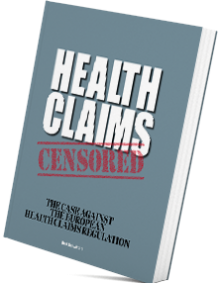When it comes to the beneficial effects of foods, the European Court warns us that we should seriously distrust “health professionals,” such as medical doctors and other medical or nutritional practitioners. “Admittedly,” so wrote the Court in a recent Judgment, “health professionals may be considered to have scientific knowledge superior to that of a final consumer, understood as an average consumer, who is reasonably well informed and reasonably observant and circumspect, […]. However, those professionals cannot be regarded as being in a position to permanently have all specialised and up-to-date scientific knowledge necessary to evaluate each food and the nutrition or health claims used in the labelling, the presentation or advertising of those foods.” [i]
There you have it. Health professionals treat their patients without having up-to-date scientific knowledge necessary to evaluate “each food” and the nutrition or health claims made for that food. Patients consulting health professionals are at risk, great risk, because “it cannot be ruled out that the health professionals themselves may be misled by nutrition or health claims which are false, deceptive, or even mendacious.” [ii]
Here, the Court implies that the real culprits are the food manufacturers, a special category of persons and companies who share a natural and untreatable inclination to use false, deceptive and mendacious claims to promote and sell their products. “Therefore,” so concludes the Court, “those health professionals risk forwarding, in all good faith, incorrect information on foods which are the subject of a commercial communication to final consumers with whom they have a relationship. That risk is all the more remarkable as such professionals are likely, because of the relationship of trust which generally exists between them and their patients, to exercise significant influence over the latter.” [iii]
Apparently, patients trust health professionals who lack the knowledge to check nutrition and health claims used in “commercial information.” At the same time, those health professionals seem to be capable of understanding and correctly evaluating “the objective information for health professionals about new scientific developments, involving the use of a technical or scientific terminology, in the situation where the communication is of a non-commercial nature.” [iv]
Meaning that when the information is non-commercial, it’s automatically “objective.” To the contrary, when the information is “commercial” it must be distrusted as potentially mendacious.
According to the Court, “if the nutritional or health claims addressed to health professionals were not within the scope of [the Nutrition and Health Claims] Regulation No 1924/2006, with the result that such claims could be used without necessarily being based on scientific evidence, there would be a risk that the food business operators would circumvent the obligations laid down by that regulation, addressing the final consumer through health professionals, in order that those professionals recommend their foods to that consumer.” [v]
In the field of medicines, i.e. the traditional ones, claims may be based on evidence showing long standing and well-established use by health professionals. In a case that would involve claims made by suppliers of traditional medicines in commercial information exclusively provided to health professionals, the Court could never typify these health professionals as good faith ignorants, because the European legislature respectfully considered these health professionals’ knowledge in the field of traditional medicines as sufficient enough to exempt those claims from the “scientific evidence” requirement.
So, when health professionals recommend traditional medicines, they are not disqualified as incompetent gullibles. To the contrary, their recommendations are based on their knowledge and practitional skills, and their knowledge forms the basis for the authorization of indications for the traditional medicines they have been recommending since ages.
But, when it comes to nutrition and health claims, “those professionals” are all of a sudden disqualified as dummies who are are intellectually incapable of evaluating health claims not issued and approved by the European Union. The Court doesn’t seem to mind that the Union bases its rejections and authorizations on the opinions of … health professionals. These, not “those,” health professionals are the 11 members of the Panel on Dietetic products, Nutrition and Allergies of the European Food Safety Agency (EFSA). They have been selected to fullfil the task of evaluating nutrition and health claims because they are regarded as being in a position to permanently have all the specialised and up-to-date scientific knowledge necessary to evaluate each food and the nutrition or health claims used in the labelling, the presentation or advertising of those foods. And, they are all saintly non-commercial.
The Court had to disqualify “health professionals” to erect another judgment concerning the field of application of the Nutrition and Health Claims Regulation (NHCR) on the basis of the speculations, allegations and assumptions on which the Regulation was based in the first place. Since the Regulation rests on bias and prejudice against food business operators it will continue to further disrupt all forms of normal communication between market participants, health professionals, consumers and patients.
The Court academically qualified that Regulation as contributing to “a high level of consumer protection, in the context of the internal market, whose effective functioning Regulation No 1924/2006 seeks to ensure.” [vi] and as enabling consumers to “make choices in full knowledge of the facts.” [vii] However, full knowledge of the facts precedes the reduction of that full knowledge to a health claim. In fact, full knowledge of the facts is wiped out by the health claim.
In the real world, outside the Court’s chambers, the NHCR effectively prevents consumers from making choices in full knowledge of the facts. Since the Court’s “health professionals” judgment, the NHCR even prevents health professionals from making choices in full knowledge of the facts.
Bert Schwitters
[i] Point 43 of the Judgment of the Court (Third Chamber) of 14 July 2016 in Case C-19/15, Request for a preliminary ruling under Article 267 TFEU from the Landgericht München I (Regional Court, Munich I, Germany), made by decision of 16 December 2014, received at the Court on 19 January 2015, in the proceedings Verband Sozialer Wettbewerb eV v Innova Vital GmbH.
[ii] Point 44 of the Judgment.
[iii] Point 45 of the Judgment.
[iv] Point 53 of the Judgment.
[v] Point 46 of the Judgment.
[vi] Point 47 of the Judgment.
[vii] Point 51 of the Judgment.




